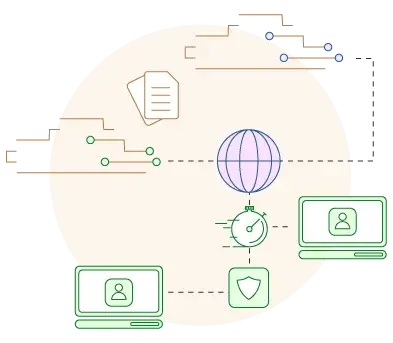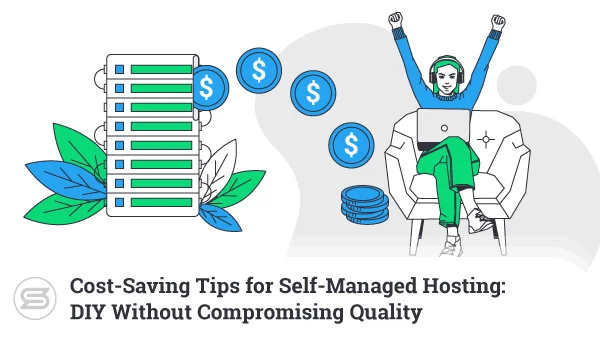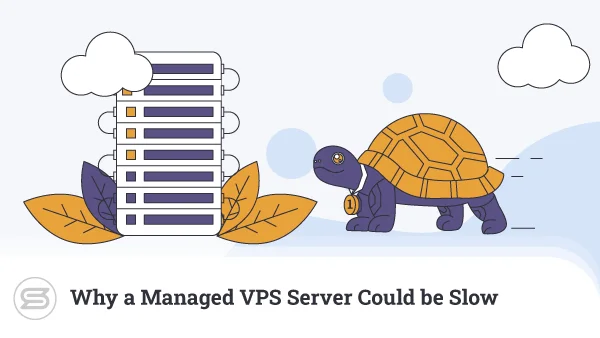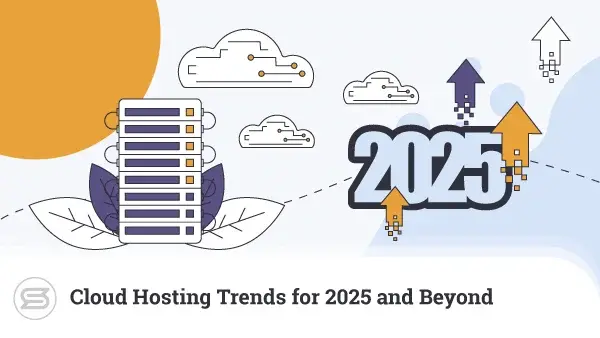Building a website is a complex multi-stage process that requires a lot of planning, dedication, and careful thinking.
It all starts with the choice of a hosting account.
One of the options is to go for a Virtual Private Server (or VPS). It’s more expensive than a shared plan, but it gives you more power. At the same time, it’s nowhere near as pricey as a dedicated server, making it a rather appealing proposition.
Unfortunately, VPS hosting as a concept is still relatively new, and many people don’t know what to expect from it.
Today, we’ll try to fix this. We’ll take a deep look into how a VPS works, we’ll show you what you need to look out for when choosing a virtual server for your project, and we’ll give you some tips on what to do to get your server and website up and running as quickly as possible.
Let’s get started.
Chapter 1
What Is a VPS?
Before answering that question, we must figure out what a hosting service does.
To work correctly, your website needs storage space for its files and processing power and memory to handle incoming requests. It must also be connected to the internet in order to be accessible across the globe. Your hosting account is responsible for providing these resources, and how it does it determines your site’s speed, reliability, and security. Virtual servers stand head and shoulders above the rest of the available solutions.
But what makes this style of hosting so special?
We’ll start with the performance aspect. Every virtual server has a predetermined set of hardware resources allocated to it. At any given time, you’re guaranteed access to the CPU cores, memory, and storage space included in your plan.
The more popular and complex your website is, the more power you need, and a VPS is unique in that it allows extra resources to be added with a couple of clicks. So, initially, you can configure your virtual server with enough CPU cores and memory to guarantee great loading speeds while the site is still small. Then, when the traffic picks up, you can easily upgrade the VPS and ensure that the growth doesn’t cause any performance drops.
On the reliability front, a virtual server is as good as the infrastructure it’s based on. Choose wisely, however, and you’re pretty much guaranteed excellent uptime and no glitches.
Unlike other hosting solutions, VPSs can be deployed on a cloud infrastructure. A cloud is a cluster of physical machines that all work to provide a stable, streamlined environment where your website resides without any service interruption. If one of these machines fails, your VPS can quickly be redeployed on another node, thus minimizing the disruption.
When it comes to security, a virtual server offers the same benefits as a physical machine. You’re the only one using the server, so there’s no risk of anyone else doing something that would compromise your site’s security. You also have a dedicated IP, so you’re not in danger of falling collateral victim to an attack targeting another user.
All in all, there are many compelling cases for VPS hosting, and in the links below, you’ll find some of them.
- When Do You Need VPS Hosting?
- What is a managed VPS?
- What is an Unmanaged VPS?
- Top Common VPS Web Hosting Questions
- Top 9 Benefits of Managed VPS Hosting
- The Integral Parts of a Managed VPS Service
- How to Resell VPS Hosting
- How to Find the Right VPS Hosting Provider for Your Website?
- How to Find the Best Fully Managed VPS Hosting
- How to Choose Your VPS Hosting Provider
- How Much Does a Typical cPanel VPS Cost?
- How Hard is it to Manage a VPS?
- How Does VPS Hosting Work – Technical Explanation
- Do VPS Servers Have Good Uptime?
- 6 Possible Uses of VPS Hosting
- How to Host a SaaS Application on VPS?
- VPS Hosting and Domain Management
- Scaling Options for Managed VPS Hosting: Exploring Vertical and Horizontal Scaling
- Managed VPS Hosting for Media Streaming: Delivering High-Quality Video and Audio Content Efficiently
- What is the Difference Between Server, Host, Virtual Host, and VPS?
- How CPU Cores Affect VPS Performance
- Cloud Hosting Trends for 2025 and Beyond
Chapter 2
VPS vs. Other Types of Hosting?
If this is your very first project, you may want to get to know the types of hosting and the differences between them. These differences often determine whether or not a particular service is suitable for you.
You obviously need to be aware of your project’s requirements, and you have to make sure the service you pick satisfies all of them.
By nature, a virtual private server is highly versatile. It’s suitable for projects of all shapes and sizes, and it can be used for a lot more than just website hosting.
Check out our guides below to learn more about VPS hosting’s incredible range of applications, the many different types of websites you can host, and its benefits compared to shared and dedicated accounts.
- What Is the Difference Between VPS and Cloud Hosting?
- What is the Best Solution for Hosting Multiple Websites?
- What Is Shared Hosting vs. VPS?
- What is Cloud VPS Hosting?
- Unmanaged or Managed VPS
- What Does Dedicated Server Hosting Mean
- VPS or Dedicated Hosting for Video Websites
- VPS Hosting vs WordPress Hosting – Finding the Right Website Solution
- VPS Hosting vs Dedicated Servers
- VPS Hosting For News Websites
- Types of Managed Hosting Services
- Types of Dedicated Server Hosting
- Shared Hosting vs Cloud Hosting
- Reseller Hosting vs VPS Hosting Difference
- Shared Hosting or Managed VPS – Which is Best for Educational Websites?
- Is Managed VPS the Best Hosting for Ecommerce Startups?
- How to Choose the Right WooCommerce Hosting
- How to Choose the Right Moodle Hosting
- How to Choose the Right Magento Hosting Provider
- How Much Does a Virtual Private Server Cost?
- Managed Hosting vs Colocation
- Choosing Your Managed VPS – What You Need to Know
- Best Hosting for Big Online Stores
- Managed VPS Hosting: A Cost-Effective Alternative to Dedicated Servers
Chapter 3
Hardware Resources & Technology
One of the main advantages of a virtual private server is its flexibility. You can add and remove CPU cores, RAM, and storage space as much as you want in order to optimize your site’s performance.
Ensuring your website is provided with enough hardware resources at all times is absolutely critical not only for its loading speeds but also for the budget. However, there are other important factors you shouldn’t underestimate.
For example, the virtualization technology your provider uses to isolate the virtual machine from the host can significantly affect the VPS’s performance and price. The underlying hardware and the infrastructure are also important for speed and reliability.
Through the links below, you’ll see what you need to look into when considering the available VPS options.
- What is a KVM VPS?
- The Best Server Virtualization Software for VPS Hosting in 2023
- SSD Cloud Hosting vs Traditional Hosting
- KVM vs OpenVZ – Which is Best for Your VPS Server?
- HDD vs SSD Cloud Server Hosting
- CPU Configurations in ScalaHosting VPS Products
- Better Efficiency with a Cloud SSD Server
- 10 Reasons Why You Need an SSD Cloud Server
- How to Select The CPU and RAM for Your Web Hosting VPS?
- What Is the Maximum Traffic VPS Can Handle?
Chapter 4
Operating Systems
Choosing the operating system of your VPS is just as important as picking the OS of your personal computer. It determines what you can and can’t do with the machine.
You first need to know what technology you’ll need to run your project. For example, if you use your VPS for Forex trading, you’ll likely need a Windows machine. On the other hand, Linux will probably be your best choice if you want to host a website.
If you go for Linux, you’ll have quite a few distributions to choose from, and this is a decision you shouldn’t take lightly, either. Some distros support the tools your project needs out of the box, while others require additional steps to set up the hosting environment for your site.
That’s why it’s essential to research the subject in a bit more detail before committing to a purchase. You can start with the links below.
- Why is Linux VPS Hosting the Best Choice?
- Which Is the Best Operating System – CentOS vs Ubuntu vs Debian vs OpenSUSE vs Windows:
- What is Linux VPS Hosting?
- What is CentOS 8?
- What Are the Benefits of Windows VPS Hosting?
- Breaking News: CentOS 8 Support Ends in December 2021
Chapter 5
Features
Every hosting account comes with its own set of features. Some of them are just extras that you may or may not have a use for. Others, however, are essential for building your project and achieving the performance and security levels you’re after.
For example, if you don’t plan on entering the reseller business, you’re unlikely to care whether you can use private nameservers. On the other hand, if the development framework you want to use is not supported, your progress could be hampered.
That’s why checking the feature lists of all available VPS solutions is important. Make sure everything you need is there. If it isn’t, contact your host’s sales team to see if there’s anything they can do about it.
Via the links below, you can learn more about some of the common tools offered by VPS providers. You’ll see how they work and how they can help you develop your website.
- Why Should I Use Private Nameservers?
- What is SSL and Why You Need It
- What Is a VPS Service for Forex Trading?
- What is a Dedicated IP and Why Do You Need It
- PHP 7.3 Available on SPanel Servers
- Nginx vs Apache
- MariaDB vs MySQL — What’s the Difference?
- LiteSpeed Web Server For High Speed & Performance
- LiteSpeed vs Apache
- How to use Root access for managed servers?
- Guaranteed Email Deliverability With SPanel
- Apache Server Latest Versions and Version History
- Managed VPS Hosting for Content-Rich Websites: Handling Traffic Spikes
- Utilizing Managed VPS for Data Analytics
- Managed VPS Hosting for Gaming: From Lag to Brag
- Managed VPS Hosting for Mobile App Backends: Scaling and Handling API Requests
- Managed VPS Hosting for Mobile App Testing
- High Availability and Failover Solutions in Managed VPS Hosting
- Managed VPS Hosting for Virtual Reality Experiences: High-Performance VR
- Managed VPS Hosting for Open-Source Projects: Collaboration and Development
- Managed VPS Hosting for Financial Data Analysis
- Enhancing Data Redundancy: A Deep Dive into Managed VPS Hosting and RAID Configurations
- Managed VPS Hosting for Podcast Networks: Hosting and Distributing Shows
- Managed VPS Hosting for Software Development Teams: DevOps Environments
- Managed VPS: Powering Up Your Forum
- Managed VPS Hosting for NFT Marketplaces: Scalability and Security
- Managed VPS Hosting for AI Chatbots: Enhancing Customer Support
Chapter 6
Security
Awareness is key when it comes to maintaining proper levels of security.
Get to know the challenges you’re facing, and crucially, make sure you’re aware of how they evolve. If you want to keep your website safe, you need to be able to adapt to the changes and alter your strategy whenever you need to.
The default setup of a virtual server is more secure than a shared plan, but you can often take additional steps to ensure further protection. Usually, these involve simple things like a proper firewall configuration and a stronger password and access control policy.
Far too many security incidents happen either because of a lack of information or the site owner’s inability to act upon it. The guides below will show you some of the most common challenges and will help you improve your server’s security.
- More safety for your data in the cloud
- Is Managed VPS secure?
- How to Secure а VPS Server? – Actionable Tips
- Cyber Attack Guide – SQL Injections
- Cyber Attack Guide: Spoofing
- Cyber Attack Guide – Phishing
- Cyber Attack Guide – Malware
- Cyber Attack Guide – DDoS Attacks
- Cyber Attack Guide: Cross-Site Scripting
- Cyber Attack Guide – Brute Force Attacks
- Is Cloud Hosting Secure?
- How Can We Make Our VPS Hosting More Secure?
- Compliance and Security Considerations in Managed VPS Hosting for the Healthcare and Finance Industries
Chapter 7
Control Panel
A web hosting control panel is a browser-based management platform for anything from setting up new projects to managing files and FTP access.
It’s the server management interface you’ll use the most, so it’s crucial to ensure it’s intuitive enough. You want to get your project going as quickly as possible, so you don’t want a control panel that takes months to master.
Ease of use is crucial when choosing the control panel for your host account, but it’s far from the only thing to consider.
The temptation is to choose the most popular platform. However, the truth is, if you take the time to research some of the available alternatives, you may see that they are sometimes even more powerful than the established names. While doing your due diligence, check whether the control panels you’re considering have all the tools you need to launch your project, and don’t forget to look into how they affect the price of the entire account.
Take a look at the articles below to learn more about the importance of your hosting account’s control panel.
- What is The Best VPS Server Control Panel
- The Role of the Control Panel in VPS Hosting
- How SPanel Helps With Hosting Management?
- Free or Premium cPanel VPS Hosting – Which One to Choose
- Creating a Website on a cPanel VPS Server – A Beginner’s Guide
Chapter 8
Managing Your VPS
With a VPS plan, you’re in control of an entire virtual machine. To make the most of it, you need to know how to manage it.
You can start by getting to know the interfaces you’ll use to connect to the server. Learn how to install additional software, and crucially, familiarize yourself with the steps for restoring data from a backup.
With a managed virtual server, the mechanisms are usually pretty simple. However, you need to know which buttons to click to ensure maximum uptime and excellent performance.
On the other hand, if you own a self-managed VPS, you may need to work with a broad range of complex tools, so it’s even more important to know what you’re in for before you start work.
The links below should give you an idea of the challenges you may face while running your own virtual private server.
- What Are the VPS Server Management Levels?
- Which Software Can I Install on VPS?
- What is SSH and How to Use It?
- What is Docker and How To Install it on a VPS?
- Top Monitoring Tools You Need For Your VPS
- Tips for Smarter Server Maintenance
- The Best Server Administration Tools for Linux
- Learning to Manage a Dedicated Server
- Installing Node.js on a VPS Server
- How to Set Up a VPS for Forex Trading?
- How To Set Up a VPS Firewall?
- How to Set Up a Mail Server on a cPanel VPS?
- How to Set Up a Business Email in VPS?
- How to Restart a VPS or Dedicated Server?
- How to Migrate Website Hosting Without Downtime
- How to Migrate from One VPS to Another?
- How to Market Your Hosting Business Successfully
- How to Install WHMCS on a cPanel VPS
- How to Install MailWizz on Your VPS?
- How to Install an SSL Certificate
- How to Install a Desktop Environment on My Ubuntu VPS?
- How to Avoid Email Blacklists?
- Backups and Disaster Recovery Strategies in Managed VPS Hosting
- Backing Up Your cPanel VPS – A Beginner’s Guide
- Add-on Solutions for your VPS or Dedicated Server
- Managed VPS Hosting for Resource-Intensive Applications
- Managed VPS Hosting for Developers: Tools and Features for Efficient Development Workflows
- Managed VPS Hosting for App Development: Ideal Environments for Developers
- Load Balancing Strategies in Managed VPS Hosting
- The Most Useful Linux SSH Commands for Website Developers
- The Benefits of VPS Monitoring for Your Business
- Why is my VPS Server Running so Slow
- Cost-Saving Tips and Tricks for Self-Managed VPS Hosting


Chapter 9
Choosing and Installing a Website Building Application
Few people build their websites from scratch nowadays. Projects of all shapes and sizes are developed with applications that set up the site and database while giving you a GUI-based backend for managing it.
These apps are often open-source and free to use, and there are dozens of them, all suitable for different types of projects. Choosing the right one can literally make or break your website, so this is not a decision you can rush.
Have a good look around and try to figure out which one is the most suitable for your particular project. See what resources you have at your disposal and make sure you can get used to the platform quickly. You wouldn’t want to waste too much time learning the application.
Below are a few guides dedicated to some of the world’s most popular website-building platforms. You’ll see how they compare against each other, and you’ll be able to make an informed decision.
- WooCommerce vs Shopify – Which Platform Should You Choose?
- WooCommerce vs Magento – Which Platform Should You Choose?
- WooCommerce vs Squarespace – Which Platform Should You Choose?
- What is a Content Management System?
- The 3 Essential Steps to Host a Magento Website
- Magento vs Shopify – The Full eCommerce Comparison
- Joomla.com vs. Joomla.org – Which to Choose?
- Is WordPress Safe for Creating an Online Store?
- How to Set Up a New WooCommerce Store
- How to Install WordPress on a VPS Hosting Account
- How to Install WooCommerce
- How to Install Magento
- How to Install Joomla?
- How to Build a Website Using Joomla?
- Drupal vs WordPress vs Joomla – Which One to Choose?
Chapter 10
Website Optimization
You can’t let your website sit still. You should be striving to attract more users and provide them with the best possible experience, so work can never stop.
No matter how great your project is, you can always improve various aspects. In fact, the number of techniques for boosting search engine rankings, optimizing performance, reducing server load, etc., is higher than you think.
There’s no way to cover them all, not least because as your site evolves, your focus will shift and incorporate different aspects of its functionality. Nevertheless, the articles below should show you some of the things you can do to steer your project in the right direction.
- Optimizing Database Performance on Managed VPS Hosting
- Where Can I Find Free Joomla Templates?
- What is TTFB and How to Minimize it?
- What Are the Best Magento Extensions for B2B?
- What Are the Best Joomla Plugins and Extensions?
- What are Contact Forms in WordPress?
- Ultimate SEO Checklist for Drupal
- The Ultimate SEO Checklist for PrestaShop
- The Ultimate SEO Checklist for Joomla
- Optimize Website Speed with WP Fastest Cache
- Optimize Website Speed with W3 Total Cache
- Optimize Website Speed with LiteSpeed Cache
- How to Secure а Magento 2 Online Store?
- How to Migrate Magento 1 to Magento 2
- Facebook Conversion Tracking in WordPress
- Best Magento Extensions for 2023
- 7 Powerful Ways to Speed Up Your WooCommerce Store
- Best Free Extensions for Magento 2
- Best 7 Drupal Modules in 2023
What is a VPS – Everything you need to know!



